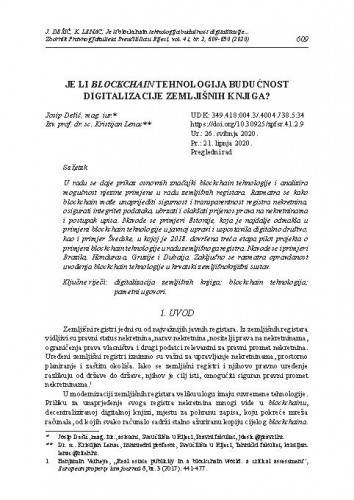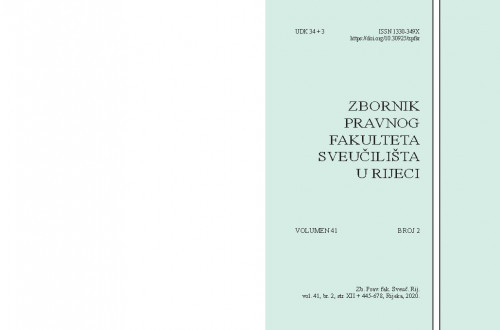U radu se daje prikaz osnovnih značajki blockchain tehnologije i analizira mogućnost njezine primjene u radu zemljišnih registara. Razmatra se kako blockchain može unaprijediti sigurnost i transparentnost registra nekretnina, osigurati integritet podataka, ubrzati i olakšati prijenos prava na nekretninama i postupak upisa. Navode se primjeri Estonije, koja je najdalje odmakla u primjeni blockchain tehnologije u javnoj upravi i uspostavila digitalno društvo, kao i primjer Švedske, u kojoj je 2018. dovršena treća etapa pilot projekta o primjeni blockchain tehnologije u radu zemljišnoga registra. Navode se i primjeri Brazila, Hondurasa, Gruzije i Dubaija. Zaključno se razmatra opravdanost uvođenja blockchain tehnologije u hrvatski zemljišnoknjižni sustav.; The paper gives an overview of the fundamental features of blockchain technology and analyses the possibility of its application in the land registry system. The authors consider whether blockchain technology can improve the security and transparency of the land registry system, ensure data integrity, accelerate and facilitate the transfer of real property rights and registration process, whether blockchain can offer something different from technologies already tested in land registry systems and whether this technological solution can change the way land registers perform their functions. This paper gives an overview of positive trends and results, primarily the example of Estonia, which has gone the farthest in applying blockchain technology in public administration and digital society, as well as the example of Sweden, but also examples of Georgia, Dubai, Honduras, Brazil. Finally, the authors consider the possibility and justification of introducing blockchain technology in the Croatian real estate register.; Dieser Beitrag analysiert die Grundmerkmale der Blockchain-Technologie und erwägt ihre Anwendung im Rahmen der Grundbuchregister. Dabei werden folgende Fragen aufgeworfen: kann Blockchain mehr Sicherheit und Transparenz der Immobillienregister verschaffen, Datenintegrität sichern, und Übertragung von Rechten auf Immobilien und Eintragungsverfahren erleichtern und beschleunigen? Estland, als Paradebeispiel in Anwendung der Blockchain-Technologie in öffentlicher Verwaltung und im Aufbau digitaler Gesellschaft wird angeführt, sowie Schweden, in dem 2018 die dritte Phase des Pilotprojekts zur Anwendung von Blockchain- Technologie im Grundbuchsregister durchgeführt wurde. Weitere Beispiele aus Brasilien, Honduras, Georgien und Dubai werden auch unter die Lupe genommen. Zum Schluss wird erörtert, ob es begründet sei, Blockchain-basiertes Grundbuchssystem in Kroatien einzuführen.; Nel lavoro si illustrano le caratteristiche essenziali della tecnologia blockchain e si analizza la possibilità del suo utilizzo nei libri fondiari. Si considera il modo in cui il blockchain può favorire la sicurezza e la trasparenza del registro immobiliare, assicurare l’integrità dei dati, accelerare e facilitare il trasferimento dei titoli sugli immobili e la procedura di registrazione. Si indica l’esempio dell’Estonia, la quale è andata più lontano nell’applicazione della tecnologia blockchain nella pubblica amministrazione e ha creato una società digitale, come anche quello della Svezia, dove nel 2018 è terminata la terza fase del progetto pilota nell’applicazione della tecnologia blockchain nel funzionamento dei libri fondiari. Nello stesso modo si riporta l’esperienza del Brasile, dell’Honduras, della Georgia e del Dubai. Infine si valuta l’opportunità dell’introduzione della tecnologia blockchain nel sistema croato dei libri fondiari.
Sažetak

 Zbornik Pravnog fakulteta Sveučilišta u Rijeci : 41,2(2020) / glavni urednik Željko Bartulović.
Zbornik Pravnog fakulteta Sveučilišta u Rijeci : 41,2(2020) / glavni urednik Željko Bartulović.